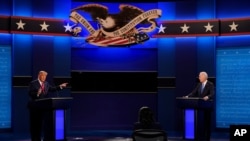U.S. Republican President Donald Trump and his Democratic challenger, former Vice President Joe Biden, sparred sharply Thursday night about the country’s world-leading coronavirus death toll at their second and final debate 12 days before the Nov. 3 national presidential election.
“He says we’re rounding the corner” in dealing with the pandemic, Biden said of Trump, as the increasing U.S. death toll has topped more than 220,000. “Anyone responsible for that many deaths should not remain as president. This is the same fella who told you it would be gone by Easter.”
Trump accused Biden of wanting to shut down the country to end the spread of the virus if he becomes president.
“He’ll close down the country if one person in our massive bureaucracy says shut it down,” Trump said.
The two candidates, both in their 70s, remained silent as each other made their opening remarks about coronavirus without interruption after the independent Commission on Presidential Debates alternately muted their microphones for two minutes apiece.
It was a distinct initial contrast to their confrontation at the first debate in late September, when they repeatedly talked over each other, Trump more so than Biden, in what political pundits concluded was the worst-ever U.S. presidential debate.
But once Trump, then Biden, delivered his opening comments, both of their microphones were turned on and they quickly started trading barbed comments on a debate stage at Belmont University in Nashville, Tennesse, as they answered questions posed by the debate moderator, NBC News White House correspondent Kristen Welker.
Their exchanges were spirited but they did not talk over each other as much as in September at their first debate.
The microphone regimen
The commission imposed the microphone regimen at the start of discussion on six current affairs issues chosen by Welker on the premise that American voters – at least the relatively few who claim they are still undecided on how they will vote – might get a clearer view of where each might take the country when one of them is inaugurated Jan. 20 if each could deliver a statement uninterrupted.
Millions of Americans have already made up their minds about the election, with more than 47 million people already having cast early ballots by mail or in person. Many have said that during the unchecked coronavirus pandemic in the U.S. they wanted to avoid coming face to face with other voters in the expected long lines at polling stations on Election Day.
Many Democratic voters favoring Biden said they wanted to be among the first to vote to oust Trump, to make him the third U.S. president in the last four decades to lose a bid for reelection after a single term. Republican voters have often told pollsters and news reporters they intend to vote on Election Day in person, as has been the norm for decades in U.S. national elections.
Thursday’s debate could be the last, best chance for Trump, a real estate entrepreneur and reality television show host-turned-politician, to cut into Biden’s persistent lead in national and statewide polls. Biden, with nearly a half century on the American political scene as a U.S. senator and second in command to former President Barack Obama, holds an 8-to-10-percentage-point lead over Trump in national polls, but a lead of about half that in battleground states that will likely decide the overall outcome.
Aside from questions about coronavirus, Welker is asking the candidates about American families, U.S. racial issues, climate change, national security and leadership.
In an interview on Fox News earlier this week, Trump assailed Welker as “totally partisan” and attacked the debate commission as biased against him.
The president said he is not happy about the decision to mute microphones of either of the candidates during the opening two-minute statements and claimed that the debate should have focused on foreign policy instead of the coronavirus pandemic and other domestic policy issues.
Trump has continued to campaign at large rallies of supporters this week, relishing the energy he believes they add to his campaign and believing they are essential to winning a second term. Biden, meanwhile, stayed out of public view as he has since last weekend, remaining at his home in the eastern state of Delaware to prepare for the debate.








